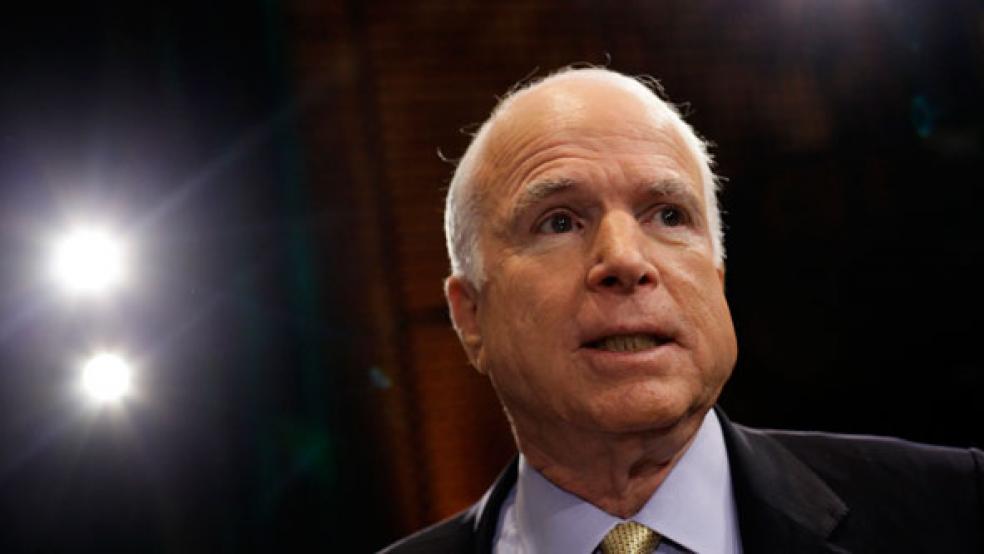As President Trump’s administration rumbles toward the end of his first month in office, one of his most visible emerging critics is octogenarian Arizona Sen. John McCain. The recently re-elected national defense hawk has by no means joined the burgeoning #Resist movement -- he has voted for all but one of Trump’s cabinet nominees -- but more than most of his GOP colleagues on Capitol Hill, he has been willing to stand up and push back against the new administration in a very public way.
McCain stepped in as the champion of the news media on Saturday, in the face of Trump’s increasingly strident attacks on the free press, which he characterized as “the enemy of the American people” in a tweet Friday afternoon.
Related: Does Anyone Still Want to Work for the Trump Administration?
“I hate the press. I hate you, especially,” McCain said jokingly in an interview with Chuck Todd of NBC’s Meet the Press. “But the fact is, we need you. We need a free press. We must have it. It's vital.”
He continued, “If you want to preserve democracy as we know it, you have to have a free and, many times, adversarial press,” McCain added. “And without it, I am afraid that we would lose so much of our individual liberties over time. That's how dictators get started.”
“When you look at history, the first thing that dictators do is shut down the press. And I'm not saying that President Trump is trying to be a dictator. I'm just saying we need to learn the lessons of history.”
McCain also went after Trump, albeit indirectly, at a high-level summit on global security in Munich last week. In remarks to attendees, McCain systematically repudiated the president’s nationalist rhetoric and his repeated insistence that the US should be less engaged in international affairs.
Related: 6 Remarkable Moments From Trump’s Wild Press Conference
The Munich conference, an annual event that draws senior leaders from around the world, was founded as a means of promoting peace and stability. Those founders, McCain said, “would be alarmed by an increasing turn away from universal values and toward old ties of blood and race and sectarianism.”
“They would be alarmed by the hardening resentment we see towards immigrants and refugees and minority groups -- especially Muslims. They would be alarmed by the growing inability -- and even unwillingness -- to separate truth from lies. They would be alarmed that more and more of our fellow citizens seem to be flirting with authoritarianism and romanticizing it as our moral equivalent.”
“But what would alarm them most, I think, is a sense that many of our peoples, including in my own country, are giving up on the West ... that they see it as a bad deal that we may be better off without ... and that while Western nations still have the power to maintain our world order, it is unclear whether we have the will.”
He promised the attendees, again without specifically mentioning Trump, that senior figures in the administration and in Congress do not share the belief that the US can safely shed its leadership role in global affairs.
Related: White House Denies Plan to Use Guard Troops as Deportation Force
McCain’s rise as a symbol of Republican resistance to some elements of the Trump agenda is the result of a combination of factors. He has not been the most consistent or even the strongest critic of the administration within his party. Nebraska Sen. Ben Sasse and Kentucky Sen. Rand Paul were strong critics of Trump during the presidential campaign, at a time when McCain was playing the role of a loyal supporter while enduring Trump’s insults in an effort to assure his own re-election.
But McCain has a combination of things that make him stand out. The first is his visibility. As a former Republican presidential nominee, he has extraordinary name recognition with the public. He also has close relationships with many in the media, his claim of “hating” the press notwithstanding, and tends to get lots of generally favorable coverage. See, for example, this cover story in New York Magazine.
The second, and perhaps most significant, is that he has the ability to get under Trump’s skin. This is most likely a side effect of his visibility. Trump is known to be a voracious consumer of cable news, and can hardly have avoided seeing McCain’s critical comments about him. The president’s personal Twitter feed overflows with negative comments about McCain, often in reaction to the senator’s public statements.
Last week, when McCain criticized a US military raid in Yemen that went badly and resulted in the death of an American special operator, Trump responded furiously on Twitter, accusing him of emboldening the enemy. His White House Press Secretary, Sean Spicer, also criticized McCain’s comments, questioning his understanding of military operations (McCain is a Navy veteran and serves as Chairman of the Senate Armed Services Committee) and suggesting that he was somehow dishonoring the fallen warrior.
Related: Trump’s Historically Low Approval Rating Proves One Thing – He’s Doing It His Way
McCain’s response was cutting.
John McCain vs. Sean Spicer. Watch. pic.twitter.com/pEjg8H4Frc
— Bradd Jaffy (@BraddJaffy) February 9, 2017
This is, in all likelihood, a self-reinforcing cycle. Trump’s focus on McCain’s criticisms assures that they will get more air time, which will further anger Trump, leading to even stronger responses, and so on. The result is that, whether or not he really is Trump’s harshest critic in the Republican Party, McCain is becoming the de facto face of GOP resistance.





